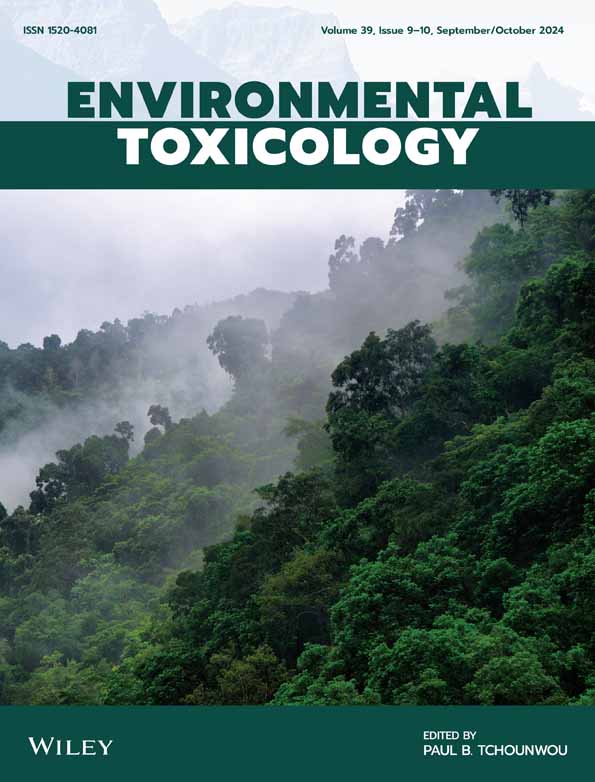Subchronic Exposure of Tri‐Ortho‐Cresyl Phosphate Reduces T‐Cell Population in Mice
IF 3.2
3区 医学
Q2 ENVIRONMENTAL SCIENCES
引用次数: 0
Abstract
Tri‐ortho‐cresyl phosphate (TOCP) is a widely used organophosphorus compound in industry and agriculture, but its immunotoxicity has not been thoroughly investigated. Therefore, this study aimed to assess the immunotoxicity of TOCP in mice by examining changes in immune cell populations and histopathological alterations in the spleen. Male ICR mice were administered TOCP via daily oral gavage at doses of 200 and 400 mg/kg body weight (BW)/d for 28 days to evaluate its effects on immune cell populations in blood and spleen. TOCP treatment at 400 mg/kg BW/d reduced white blood cell counts by 18% and decreased lymphocyte counts by 10.5% compared to the control group. Specifically, CD3亚慢性暴露于三邻甲酰磷酸盐可减少小鼠T细胞数量
三邻甲酰磷酸(TOCP)是一种广泛应用于工业和农业的有机磷化合物,但其免疫毒性尚未得到充分的研究。因此,本研究旨在通过检测小鼠脾脏免疫细胞群的变化和组织病理学改变来评估TOCP对小鼠的免疫毒性。以雄性ICR小鼠为研究对象,每日灌胃200和400 mg/kg体重/d的TOCP,连续28 d,观察其对血液和脾脏免疫细胞群的影响。与对照组相比,400 mg/kg体重/d的TOCP治疗使白细胞计数减少18%,淋巴细胞计数减少10.5%。特别是,血液中CD3+CD4+ T细胞计数下降了17.4%。在脾脏中,TOCP暴露使T细胞的比例降低了13.3%。TOCP也破坏了脾白髓的结构完整性。在体外实验中,TOCP代谢物cresyl saligenic phosphate (CBDP)抑制脾脏淋巴细胞增殖,选择性地增加T细胞比例21.25%,抑制B细胞比例13.18%,与体内实验结果不同。这表明,体内观察到的T细胞减少可能不仅仅是由于TOCP对T细胞的直接细胞毒性作用。这些观察到的免疫细胞计数和脾脏组织学变化表明,TOCP在体内具有全身免疫毒性,可能导致免疫监视和防御功能受损。
本文章由计算机程序翻译,如有差异,请以英文原文为准。
求助全文
约1分钟内获得全文
求助全文
来源期刊

Environmental Toxicology
环境科学-毒理学
CiteScore
7.10
自引率
8.90%
发文量
261
审稿时长
4.5 months
期刊介绍:
The journal publishes in the areas of toxicity and toxicology of environmental pollutants in air, dust, sediment, soil and water, and natural toxins in the environment.Of particular interest are:
Toxic or biologically disruptive impacts of anthropogenic chemicals such as pharmaceuticals, industrial organics, agricultural chemicals, and by-products such as chlorinated compounds from water disinfection and waste incineration;
Natural toxins and their impacts;
Biotransformation and metabolism of toxigenic compounds, food chains for toxin accumulation or biodegradation;
Assays of toxicity, endocrine disruption, mutagenicity, carcinogenicity, ecosystem impact and health hazard;
Environmental and public health risk assessment, environmental guidelines, environmental policy for toxicants.
 求助内容:
求助内容: 应助结果提醒方式:
应助结果提醒方式:


